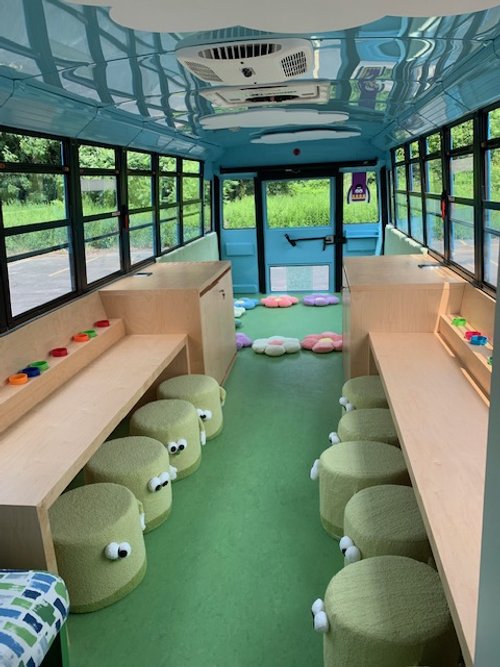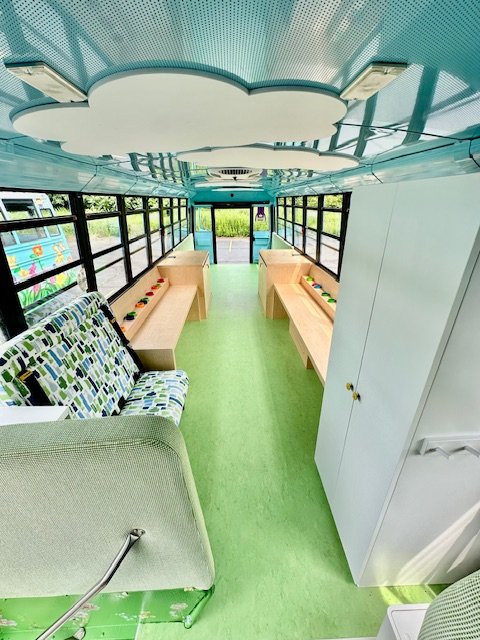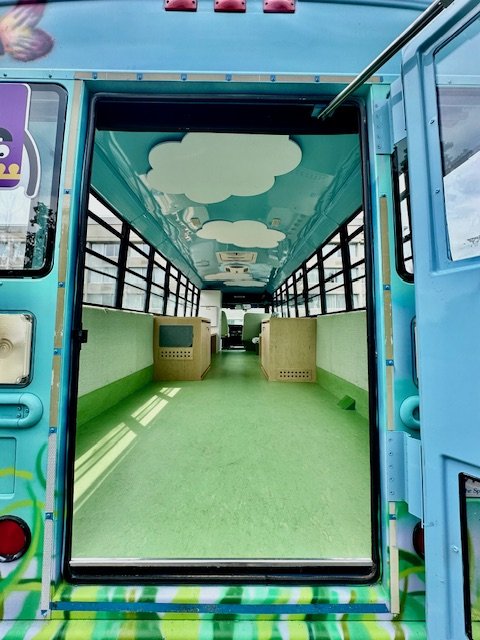
COLORI
Playspace Express

COLORI Playspace Express
Problem We Are Solving
An unprecedented number of under-school-age children are living in hotels and motels across Massachusetts. They have experienced toxic levels of stress during migration and are now living in shelters with large numbers of families. Toxic levels of stress during children’s earliest years (0-5) have been proven to negatively impact brain architecture, executive function, social and emotional regulation, and physical wellbeing leading to lasting negative impacts and life outcomes.
The Mobile Learning Initiative
The Massachusetts Governor's Executive Office of Education and the Department of Early Education and Care (EEC) are supporting a joint initiative between three (3) organization partners, Amal Alliance, Horizons for Homeless Children, and Neighborhood Villages, to provide developmentally appropriate and trauma-informed care to migrant and displaced children living in remote motel shelters.
This initiative aims to offer support for under-school-age children who have recently immigrated to the US. It entails a multifaceted approach that combines social and emotional programming, and the provision of developmentally appropriate curriculum for both children and their families. The goal is to support vulnerable families during this time of transition by providing access to high quality social and emotional learning (SEL) experiences, as well as opportunities for play.
Through a hub and spoke model consisting of one staffed playspace combined with two mobile learning buses, we provide children with access to developmentally appropriate and trauma-informed social and emotional learning and play experiences to support their health and wellbeing. We will also provide weekly touch points with children and their families to identify other support services required for children to thrive.
Meet the Consortium
The Massachusetts Governor's Executive Office of Education and the Department of Early Education and Care (EEC)
The Department of Early Education and Care's mission is to support the healthy growth and development of all children by providing high quality programs and resources for families and communities.
The Executive Office of Housing and Livable Communities (EOHLC)
The Executive Office of Housing and Livable Communities (EOHLC), formerly known as the Massachusetts Department of Housing and Community Development (DHCD), was established in 2023 to create more homes and lower housing costs for Massachusetts residents. EOHLC also distributes funding to municipalities, oversees the state-aided public housing portfolio, and operates the state's Emergency Family Shelter (EA) program.
Amal Alliance
Amal Alliance, Inc. is a 501c(3) nonprofit organization dedicated to empowering displaced and disenfranchised children through education and social development programs around the globe in both informal and formal education settings. Their programming is built on four (4) pillars of support:
Social Emotional Learning.
Early Childhood Development.
Psychological Support.
Peacebuilding.
Amal Alliance’s Colors of Kindness program is a multi-award winning innovation that aims to improve children’s social and emotional skills and increase the overall wellbeing of children and their caregivers. The program has been implemented in 6 countries and has benefitted over 286,000 children in counting.
Horizons for Homeless Children
Horizons for Homeless Children is the leading organization providing trauma-informed play-based programming in the family shelter system across Massachusetts. The Playspace program capitalizes on strong partnerships with individual shelters to create dedicated spaces for children to learn, play, and thrive.
At its headquarters in Roxbury, Horizons also operates the highest quality early childhood program in the state serving 225 children experiencing homelessness aged two months to five years old. Children are enrolled free of charge. Children experiencing homelessness experience intense instability and trauma which cause toxic stress, affecting brain development. Horizons disrupts the detrimental effects of homelessness by providing a stimulating and nurturing early education environment with cutting-edge STEM and literacy programming, trauma-informed curriculum, and social-emotional supports which mitigate the impacts of homelessness.
Recognizing that a child’s success is deeply connected to the strengths of their parent, Horizons employs a two-generation model that assigns a coach to work with each parent in the areas of family stability, housing, wellbeing, education, career, and financial management. These best practices inform all of Horizons’ strengths-based, parent-centric work.
Neighborhood Villages
Neighborhood Villages envisions a transformed, equitable early childhood education system that lifts up educators and sets every child and family up to thrive.
In pursuit of this vision, we design, evaluate, and scale innovative solutions to the biggest challenges facing early childhood education providers and the children and families who rely on them, and drive policy reform through advocacy, education, and research.
Our interlocking programs are designed to bolster the capacity of the early childhood education system, in Massachusetts and across the country, to:
Recruit, retain, and develop a professional workforce of early educators
Support educator professional development and program quality to promote excellence in education
Meet the full-scope wraparound needs of children and families
Programming
Colors of Kindness
Colors of Kindness is a ten [10] week early childhood curriculum designed to holistically support all aspects of childhood development for children aged 3 to 5. The program uses colors to represent various skills, engaging children through interactive activities that foster excitement and discovery.
Key Competencies:
Self-Awareness: Emotional intelligence and self-esteem.
Self-Management: Behavioral regulation and self-efficacy.
Creativity: Goal-oriented thinking, curiosity, and imagination.
Relationship Building: Effective communication and teamwork.
Social Awareness: Empathy, compassion, and an appreciation for diversity.
The curriculum emphasizes resilience across themes foundational to socio-emotional learning, such as empathy, communication, and conflict resolution. This holistic approach not only supports individual growth, but enhances social interactions. Children gain a deeper understanding of themselves and the world around them, laying a strong foundation for lifelong socio-emotional health and well-being.
Horizons Parent-Child Playgroups
The team at Horizons is committed to ensuring that every child can learn, play, and thrive and does so by supporting the primary influence in a child's life—the parent. Horizons will offer a five-week series of engaging playgroups to foster connections and empower both parents and children. These sessions will spotlight the significant learning skills in the early years of life. Participating parents will find their own capabilities enhanced with fresh ideas, engaging parent-child play activities, and innovative methods for nurturing their child’s growth and development. This program embodies a thoughtful approach to strengthening the parent-child bond, recognizing the diverse challenges and joys of parenting. Playgroups focus on a key topic each week including:
The Importance of Play
Supporting Social & Emotional Development
Encouraging Communication & Language Skills
Behavior and Routines
Early Literacy Skills
Coordination of Services for Children
Our efforts will focus on the needs of the youngest children living in shelter by:
Connecting children with local providers for services including early intervention, mental health, maternal and child relational health, Head Start, etc.
Working to ensure all children are being provided access to play and enrichment activities across the service area each week.
Maintaining accurate records of program activities, participant demographics, and outcomes.
ADDITIONAL DONORS
COLLABORATORS
Tour the
Bus







Learn more about
the Initiative
For any inquiry, please fill in the form.































